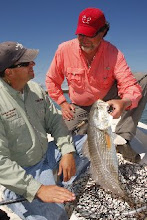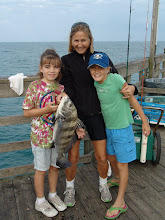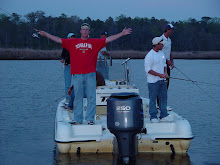.jpg)
Jim Holshouser and Jim Martin both commissioned efficiency studies when they were elected Governor in an attempt to improve the way state government delivered services. One of the conclusions of both studies was that the WRC and MFC should be merged to save significant funds and to improve efficiency. When the salt water fishing license was enacted in 2006, the law mandated that the WRC give written approval to all proposals from MFC to expend money from the Marine Resources Trust Fund and the Marine Resources Endowment Fund. Most coastal states have merged Marine and Fresh Water Fish and Wildlife agencies. The reasons are powerful and obvious:
1. Fiscal Savings – by merging the two agencies, an economy of scale would be realized that would eliminate duplication of programs and services that are quite similar in most regards, thereby saving millions of dollars every year and presenting a new image of efficiency to the general public. Just a few of the duplicated programs are:
a. Enforcement of boating laws and coastal recreational fishing license requirements. We now have vessels of each agency on the water together but neither agency enforces the other’s rules, thus creating confusion to the public and inefficiency.
b. Each agency currently has its own air force, including pilots and aircraft. Great efficiency would be realized by combining the two air forces into one.
c. Each agency presently has its own communications system, in many cases each has a radio repeater on the same tower and the state pays two rental fees for the use of the tower. Consolidating the two communication systems would result in better purchasing and maintenance bargaining power with vendors, and would streamline the interface with the general public. Now there are two communications centers, one in Morehead City and one in Raleigh. One entire center could be eliminated and the cost of several radio operator positions could be saved
d. MFC has no grass roots and outreach section to get the important message out to their constituents, MFC has no magazine. WRC has both functioning at high levels of output and effectiveness.
e. Both agencies have well developed Administrative Sections to handle Personnel, budget, inventory, warehousing, fulfillment, purchasing, accounts payable, federal financial assistance, information technology and other administrative responsibilities. Great efficiency and savings can be realized by combining these identical functions.
f. Both agencies have several and elaborate facilities on the coast which could be shared, thereby creating economy and efficiency. For instance oyster shells for reef creation could be readily stored on WRC gamelands, avoiding the cost of renting or buying land on which to store oyster shells.
g. The fishery research and management work of the two agencies are almost identical except for the salinity of the water and the difference in fish species. The procedures and requirements are almost identical. Great efficiency and savings can be realized by combining and sharing the laboratories, equipment, and technicians required to do this work.
h. Coordination and interaction with other agencies inside and outside state government and with the several conservation organizations and general public would be improved by consolidation and the interface with all these entities would be simplified.
i. Both the MFC and WRC have large boards that are expensive and cumbersome. Many would say that these Commissions are too large to be responsive and efficient. A single Commission of 9 members could readily handle the responsibilities of marine and fish and wildlife programs in NC. Such consolidation would streamline many processes that currently require participation and action by each board separately. Plus one Commission could operate in shorter time frames and less expensively.
j. The administrative staffs of both agencies could be streamlined thus freeing up positions to serve in research, habitat protection and management, and law enforcement.
These are just a few of the many savings and improvements that can be accomplished by combining WRC and MFC / DMF.
How can this merger be accomplished?
* Both agencies, WRC and MFC / DMF, are part of the Executive Branch of government, so the Governor would have to endorse the change. The Governor could recommend to the General Assembly in 2009 that the two agencies be combined. The actual combination would then be done by amending the statutes that apply.
* Due to the complicated interplay of laws and rules as they now exist, the NCGA may well see merit in appointing a Study Commission to develop plans for merger to be reported in bill format to the 2010 Short Session of the NCGA (May 2010.) The Study Commission would represent the two agencies, the Governor, the NCGA, and constituencies in some workable and fair format. The Study should be charged in the legislation to conduct certain reviews to determine the savings and improvements to be realized and the Study should also have a required Public Review and Input aspect to its work.
It is quite feasible that the applicable laws could be changed by October 1, 2010 and that the merger could be accomplished by July 1, 2012. The result would be a less expensive, more efficient, more responsive, more effective program to administer the fish and wildlife and marine resources of NC and to provide equitable access to these resources for livelihoods and recreation to all within the ability of the resources to support such activities.
In light of recent and historical actions by the MFC, and the absolute necessity for the NC Government to "tighten its belt", this merger just makes plain common sense!
1. Fiscal Savings – by merging the two agencies, an economy of scale would be realized that would eliminate duplication of programs and services that are quite similar in most regards, thereby saving millions of dollars every year and presenting a new image of efficiency to the general public. Just a few of the duplicated programs are:
a. Enforcement of boating laws and coastal recreational fishing license requirements. We now have vessels of each agency on the water together but neither agency enforces the other’s rules, thus creating confusion to the public and inefficiency.
b. Each agency currently has its own air force, including pilots and aircraft. Great efficiency would be realized by combining the two air forces into one.
c. Each agency presently has its own communications system, in many cases each has a radio repeater on the same tower and the state pays two rental fees for the use of the tower. Consolidating the two communication systems would result in better purchasing and maintenance bargaining power with vendors, and would streamline the interface with the general public. Now there are two communications centers, one in Morehead City and one in Raleigh. One entire center could be eliminated and the cost of several radio operator positions could be saved
d. MFC has no grass roots and outreach section to get the important message out to their constituents, MFC has no magazine. WRC has both functioning at high levels of output and effectiveness.
e. Both agencies have well developed Administrative Sections to handle Personnel, budget, inventory, warehousing, fulfillment, purchasing, accounts payable, federal financial assistance, information technology and other administrative responsibilities. Great efficiency and savings can be realized by combining these identical functions.
f. Both agencies have several and elaborate facilities on the coast which could be shared, thereby creating economy and efficiency. For instance oyster shells for reef creation could be readily stored on WRC gamelands, avoiding the cost of renting or buying land on which to store oyster shells.
g. The fishery research and management work of the two agencies are almost identical except for the salinity of the water and the difference in fish species. The procedures and requirements are almost identical. Great efficiency and savings can be realized by combining and sharing the laboratories, equipment, and technicians required to do this work.
h. Coordination and interaction with other agencies inside and outside state government and with the several conservation organizations and general public would be improved by consolidation and the interface with all these entities would be simplified.
i. Both the MFC and WRC have large boards that are expensive and cumbersome. Many would say that these Commissions are too large to be responsive and efficient. A single Commission of 9 members could readily handle the responsibilities of marine and fish and wildlife programs in NC. Such consolidation would streamline many processes that currently require participation and action by each board separately. Plus one Commission could operate in shorter time frames and less expensively.
j. The administrative staffs of both agencies could be streamlined thus freeing up positions to serve in research, habitat protection and management, and law enforcement.
These are just a few of the many savings and improvements that can be accomplished by combining WRC and MFC / DMF.
How can this merger be accomplished?
* Both agencies, WRC and MFC / DMF, are part of the Executive Branch of government, so the Governor would have to endorse the change. The Governor could recommend to the General Assembly in 2009 that the two agencies be combined. The actual combination would then be done by amending the statutes that apply.
* Due to the complicated interplay of laws and rules as they now exist, the NCGA may well see merit in appointing a Study Commission to develop plans for merger to be reported in bill format to the 2010 Short Session of the NCGA (May 2010.) The Study Commission would represent the two agencies, the Governor, the NCGA, and constituencies in some workable and fair format. The Study should be charged in the legislation to conduct certain reviews to determine the savings and improvements to be realized and the Study should also have a required Public Review and Input aspect to its work.
It is quite feasible that the applicable laws could be changed by October 1, 2010 and that the merger could be accomplished by July 1, 2012. The result would be a less expensive, more efficient, more responsive, more effective program to administer the fish and wildlife and marine resources of NC and to provide equitable access to these resources for livelihoods and recreation to all within the ability of the resources to support such activities.
In light of recent and historical actions by the MFC, and the absolute necessity for the NC Government to "tighten its belt", this merger just makes plain common sense!


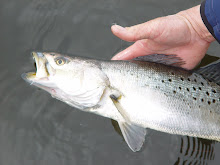



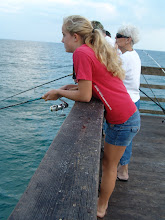

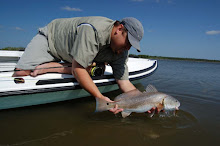.jpg)


